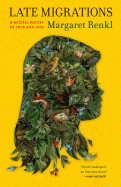
Margaret Renkl's Late Migrations: A Natural History of Love and Loss is a quiet but stunning collection of essays merging the natural landscapes of Alabama and Tennessee with generations of family history, grief and renewal. Renkl's voice sounds very close to the reader's ear: intimate, confiding, candid and alert.
Renkl grew up in "lower Alabama," the adored child of parents, grandparents and great-grandparents: in an old picture, "my people are looking at me as if I were the sun." Her childhood was lived close to the red dirt, pine needles and blue jays of that space. As an adult, she lives in Nashville with a husband and three sons, and carefully cultivates a backyard garden with bird nests, baths and feeders. These are the backdrops to her observations of nature. "The cycle of life might as well be called the cycle of death: everything that lives will die, and everything that dies will be eaten."
Late Migrations studies family and loss: the deaths of great-grandparents, grandparents and parents; Renkl becoming a parent herself and worrying about her children. This is also a book about the labors of bluebirds, red-tailed hawks and cottontails. A book of subtlety and sadness, yes, but also a tough, persistent joy in the present and the future. "Human beings are creatures made for joy," Renkl writes. "Against all evidence, we tell ourselves that grief and loneliness and despair are tragedies.... In the fairy tale we tell ourselves, darkness holds nothing resembling a gift." Part of her work in this book is to find and recognize the gift in the darkness. --Julia Kastner, librarian and blogger at pagesofjulia

